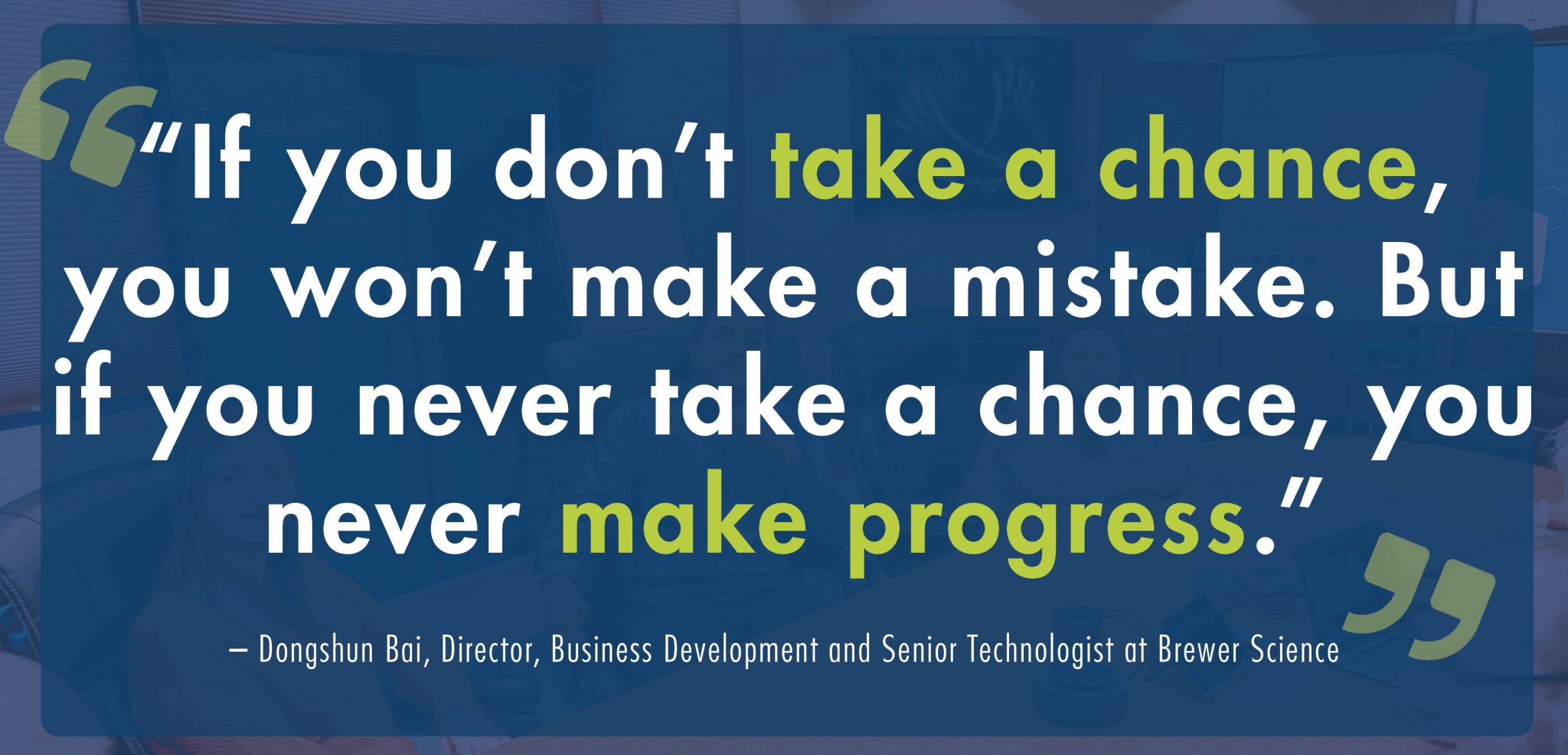Adaptation, Transition, and Inspiration for Success
Join Tom Brown, Executive Director, Semiconductor Business Unit at Brewer Science, as he shares inspirational leadership advice and professional growth stories.
Pursuing a goal that does not provide the foundational impact for success may give you a fleeting sense of accomplishment but is not sustainable or repeatable. This further exemplifies the importance of determining project value.
In operations, we had the goal of becoming a “World-Class Manufacturer.” We began pursuing operational excellence that we called Tsungani (pronounced sun-gah-nee), a Cherokee term to describe “excellence” or “above others.” Through a weekly meeting focused on alignment and the pursuit of excellence, we encouraged ownership in the process and active engagement. This effort culminated in recognition by our customers that we had achieved world-class manufacturing status.
Adaptations
In business development, we adapted the strategies of the Tsungani meetings to revitalize and refocus our efforts on new opportunities. These meetings are referred to as “Win the Day.” The purpose is to encourage a culture of achievement, by celebrating the little “wins” that move us closer to our goal. We also discuss the role that each employee-owner plays in working together towards success.
Winning is a concept engrained in our human nature. People enjoy the recognition and collaboration that comes along with being part of a team. The difference between good teams and great teams is the level of trust on which their relationship is founded and the commitment to the successful execution of the process. However, you must ask yourself: what happens when winning is taken for granted?
Transitions
During a service award ceremony, my coworker, Dongshun Bai, reflected on his 15 years at Brewer Science. Dongshun had made the transition from a product development position to a business development position. He spoke to the packed conference room and looked into the camera for those who were attending virtually and said, “If you don’t take a chance, you won’t make a mistake. But if you never take a chance, you never make progress.” This served as a challenge to people who became comfortable not pushing the status quo, as it seems safer to standby. They need to recognize that this does not contribute to their team’s winning. Eventually, their lack of contribution and engagement will limit their ability to be appreciated and impactful.
Theodore Roosevelt said, “Happiness lies in the joy of achievement and the thrill of creative effort.” Even if you are not a leader, you are still part of the winning process. This concept is similar to people watching sports on television. They’re experiencing the game, the thrills, the struggles, but only from a distance, not from experiencing the real battles and challenges.
Inspiration
Winning has become a controversial topic over the last few years. The participation trophy mindset of eliminating competition in order to maintain self-esteem has been seen throughout sports. When you apply this mentality to the workplace, new employees start in the workforce with expectations of immediate promotion and payoffs which has been viewed as a sense of entitlement. From my perspective, the only victory, the only WIN of value, is when you have the opportunity to compete and earn that win. A forfeit is a hollow victory and one that will not be remembered except in disappointment.
When you consider the challenge that Dongshun raised during his recognition, about “if you never take a chance, you will never make progress,” it makes you consider whether people are willing to be part of the game and compete.
All employees, regardless of experience or title, need to put in the time and effort in to compete for company success, so they can fully enjoy the rewards of a job well done or an accomplishment earned. When you step onto a basketball court or into an office, success depends on what you do and how you make your team better.
Questions for new employees:
- Do they understand their role in the game and know how to compete?
- What does success look like to them and their team?
- What contributions do they make towards “winning” the objective?
Questions for experienced employees:
- Are they still taking chances and making progress?
- Do they understand what it takes to WIN today versus what it took yesterday?
- Are they still willing to put in the time necessary to WIN in today’s challenging economic times or do they feel they’ve already made their investment and no longer have to participate or compete?
- Do they recognize that they are in a game or are they on the sidelines simply observing?
Winning isn’t only evident on the scoreboard, but also in the improvements made by individuals and teams. By winning the day, you are not saying it is over or that you have reached the end. Winning the day means you have worked hard to improve and have helped move your team forward. Winning means your pursuit of excellence was fruitful and that you are better today than you were yesterday. You are in the game. You are competing to win. The desire to improve, to have an impact on others and to leave a legacy is what helps you WIN the day and beyond today.
Brewer Science is a company that believes deeply in sustaining long-term success through value-based culture, diversity, and growth. Learn more about Brewer Science’s company culture.


